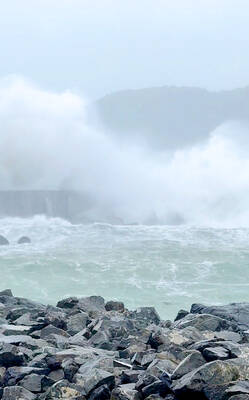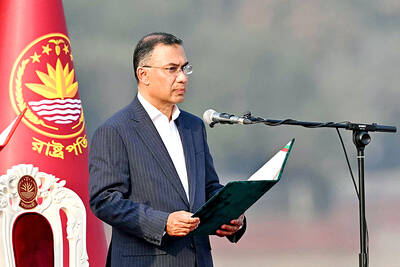Nearly two months before sched-uled elections, the Afghan electoral commission announced yesterday that it will close all registration sites across the country by today. The decision was announced by Aykut Tavsel, a spokesman for the Joint Electoral Management Body.
The agency, which started reg-istering Afghans last December, has registered nearly 10 million of the 10.5 million eligible to vote.
"The number might reach the total estimated 10.5 million before it [registration] is officially closed" today, Tavsel said, adding that forty-one percent of registrants are women.
He also said some people had requested continued registration in regions where security concerns had been an issue.
David Avery, the agency's operations chief, said in a statement that the voter registration had been successful.
"Our goal was to allow all of the Afghan people the possibility of registering to vote and [to] take part in the election," Avery said. "We are pretty happy. We think it's been a success."
POPULAR SUPPORT
The south-central region of Afghanistan is still a hot spot, with almost daily Taliban attacks on coalition forces. Avery said the attacks were a concern to the registration agency.
"When we started this operation we expected that there would be three provinces which would pose a difficulty, and may in fact not be accessible, that was Zabul, Paktika and Uruzgon," Avery said.
"In fact we registered people in all of those (provinces), and we have made it to almost every district in the country, and there were many that we thought would not be possible," he said.
The ousted members of the former Taliban regime who have vowed to interrupt the election process have so far killed 13 election workers and injured dozens of others. They have also killed at least 16 men who were carrying voting cards.
Last week, the agency published the final list of candidates, which showed that 17 candi-dates, including one woman, are due to run against President Hamid Karzai.
Karzai has governed since the fall of the Taliban regime at the end of 2001 and remains the favorite in the election race.
Those opposing him will include female pediatrician Masuda Jalal and General Abdul Rashid Dostum, who hopes to garner the votes of Uzbek Afghans.
Presidential and parliamentary elections were originally to take place in June but were postponed due to logistical and security concerns. A new parliament will be now be chosen in April 2005.
FACTIONAL CLASHES
Meanwhile, eight militiamen, including two commanders, were killed yesterday when fighting erupted between two rival warlords over control of a district in western Afghanistan, the leader of one of the factions said.
Faction commander Amanullah Khan said his forces had clashed with those loyal to Western Herat province Governor Ismail Khan in Shindand district.
They eventually drove out the governor's men, he said. "Fighting started at two in the morning and went on until four."
"Eight people were killed, including Herat garrison commander Saifullah and General Zakim Khan of the border brigade, who supported Ismail Khan," he said.
He said his forces had taken control of Shindand and pushed Ismail Khan's fighters into a neighboring district.
Shindand, some 660km west of Kabul, has been controlled both by forces loyal to Ismail Khan, an ethnic Tajik, and Amanullah Khan, a Pashtun. The factions have clashed often in the past two years.

Heavy rain and strong winds yesterday disrupted flights, trains and ferries, forcing the closure of roads across large parts of New Zealand’s North Island, while snapping power links to tens of thousands. Domestic media reported a few flights had resumed operating by afternoon from the airport in Wellington, the capital, although cancelations were still widespread after airport authorities said most morning flights were disrupted. Air New Zealand said it hoped to resume services when conditions ease later yesterday, after it paused operations at Wellington, Napier and Palmerston North airports. Online images showed flooded semi-rural neighborhoods, inundated homes, trees fallen on vehicles and collapsed

‘COST OF DEFECTION’: Duterte’s announcement could be an effort to keep allies in line with the promise of a return to power amid political uncertainty, an analyst said Philippine Vice President Sara Duterte yesterday announced she would run for president of the Southeast Asian nation of 116 million in 2028. Duterte, who is embroiled in a bitter feud with Philippine President Ferdinand Marcos Jr, was impeached last year only to see the country’s Supreme Court throw the case out over procedural issues. Her announcement comes just days before her father, former Philippine president Rodrigo Duterte, begins a pretrial hearing at the International Criminal Court (ICC) in the Netherlands over crimes against humanity allegedly committed as part of a brutal crackdown on drugs. “I offer my life, my strength and my future

NOT YET THERE: While the show was impressive, it failed to demonstrate their ability to move in unstructured environments, such as a factory floor, an expert said Dancing humanoid robots on Monday took center stage during the annual China Media Group’s Spring Festival Gala, China’s most-watched official television broadcast. They lunged and backflipped (landing on their knees), they spun around and jumped. Not one fell over. The display was impressive, but if robots can now dance and perform martial arts, what else can they do? Experts have mixed opinions, with some saying the robots had limitations and that the display should be viewed through a lens of state propaganda. Developed by several Chinese robotics firms, the robots performed a range of intricate stunts, including martial arts, comedy sketches and choreographed

POST-UPRISING: Bangladesh Nationalist Party lawmakers were yesterday expected to formally elect Tarique Rahman as their leader and new head of government Bangladesh’s prime minister-to-be Tarique Rahman and lawmakers were yesterday sworn into parliament, becoming the first elected representatives since a deadly 2024 uprising. Rahman is set to take over from an interim government that has steered the country of 170 million people for 18 months since the autocratic government of Sheikh Hasina was overthrown. The lawmakers, who promised loyalty to Bangladesh, were sworn in by Chief Election Commissioner AMM Nasir Uddin. Bangladesh Nationalist Party (BNP) lawmakers are expected to formally elect Rahman as their leader, with President Mohammed Shahabuddin then to administer the oath of office to the prime minister and his ministers